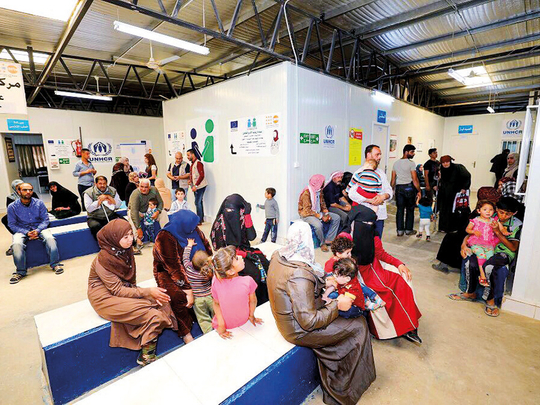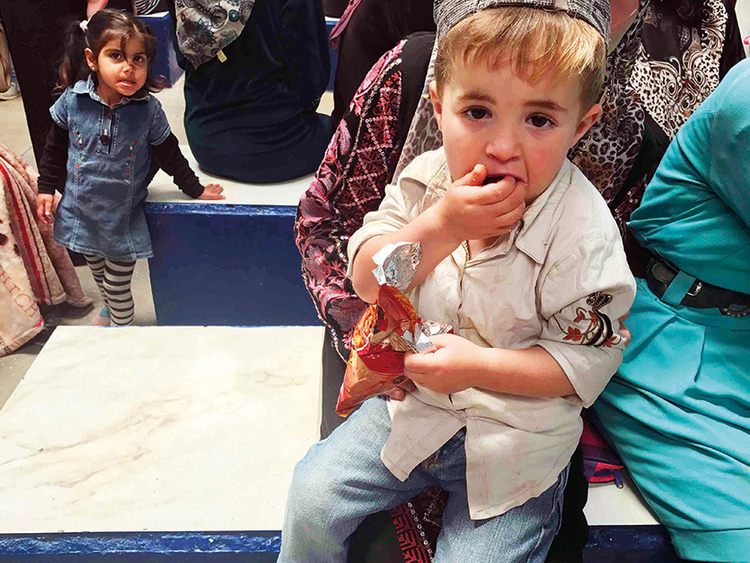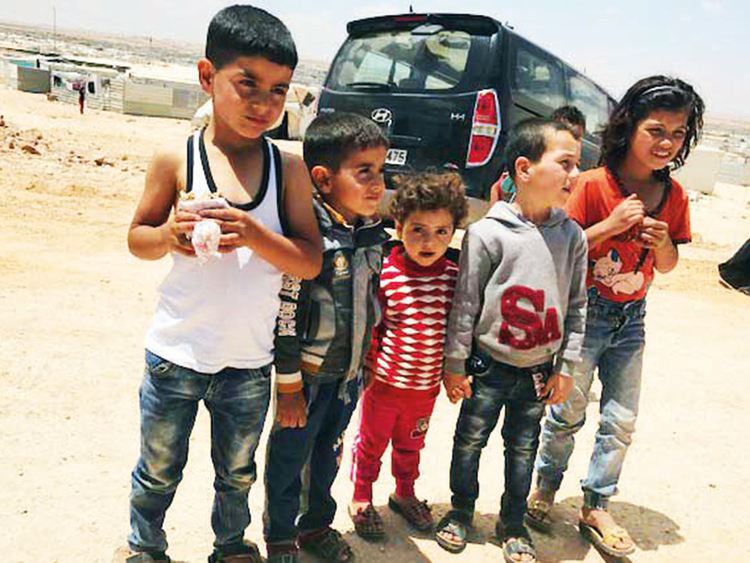
Zaatari Camp, Jordan: A small Syrian boy stands by an oversized bicycle by a clinic at Al Zaatari Camp in Jordan. With his arms crossed and leaning on the bike’s seat, he surveys his surroundings with a keen eye as patients enter and exit.
People on wheelchairs, elderly men and women, and babies being carried in the arms of their parents, are what he sees.
Half an hour later upon retruning to the same location, I see him riding his bike along a busy road opposite the clinic, which is one of the busiest clinics in Al Zaatari Camp, a temporary home to an estimated 80,000 Syrian refugees living across 12 districts inside pre-fabricated caravans.
In a vibrant red shirt matching the handle bars of his bike, 13-year-old Bashar Al Okly smiles at me. Who has he been waiting for?
“My mother is picking up her diabetes medicine, so I’m just waiting for her to finish,” he says. “I use my bicycle to bring my mother to the clinic always,” he adds, pointing to the back of his bike, to show me where his mother sits.
Al Okly was treated some months ago for a broken hand at the same clinic, which is called the Big Heart Foundation (TBHF) Clinic, the largest facility providing medical and health care services to thousands of residents at Al Zaatari Camp for free.
The conversation with Al Okly came during a visit to the camp organised by Sharjah based TBHF for UAE journalists on Sunday.
The tour highlighted the efforts of the foundation in improving the humanitarian conditions of Syrian refugees and the impact of UAE community’s donations.
Nine facilities
One of nine primary health care centres at the camp — operated by the Jordan Health Aid Society and the United Nations High Commissioner for Refugees (UNHCR) and funded by Sharjah’s global humanitarian organisation dedicated to refugees (TBHF) — the clinic, in just three years, has turned into a focal point for comprehensive primary, mental, and reproductive health care services on a 24-hour basis.
A total of Dh30 million in donations between 2013 and 2016 from the UAE community towards the TBHF has helped the foundation implement the health and service projects for the Zaatari refugees.
Inside the clinic, patients wait their turn in a central area. Ceiling fans stir the air to keep patients cool. A big sign hangs from the ceiling pointing to the gynaecology section.
A nurse calls the name of the next patient through a squeaky speaker.
Holding her child in her arms as he munches on a bag of chips, 32-year-old Nama Akrad, a mother of three boys and two girls, says her son has been getting epileptic seizures.
“I came for a consultation so they can run some tests and see how he can be treated. It’s the best clinic around and I know that they will cover the costs, including of his treatment.”
In a room nearby, Alia Al Shermar, a receptionist in a pink hijab, says they receive around 600 patients on average every day, with respiratory illnesses and sinus infections being the common illnesses. “The dusty weather affects a lot of people at the camp, especially children,” she said.
“We get a lot of cases of asthma and children with lice as well. When the season changes, more patients fall sick and we have to catch up with treatment,” she said.
Each patient has a file, she added. “We are almost like a hospital.” According to figures, from July to December 2016, TBHF provided 108,000 primary health consultations for Syrian refugees in the Zaatari Camp. Nutrition goals were set at helping 8,000 displaced Syrian refugees and the figure achieved was 13,000.
Reproductive health care more than doubled its target, with 24,500 people receiving consultations.
Dr Yaroup Aklouni, President of the Jordan Health Aid society says the this clinic has “exclusive services”. “It’s the only clinic here that functions 24 hours, has an advanced laboratory, an ambulance service, and the only one to have vaccination programmes for the Zaatari children.
It is also the only clinic to send out a team of doctors to patients who cannot come to the clinic.”
Since the clinic opened, it has exceeded a quarter million consultations. Dr Aklouni adds: “This is the only clinic which supplies medicines for all chronic illnesses such as heart conditions. No patient has fallen short of being given his medicines.”
Challenges
Fayza Masri, a camp resident of six years from Dar’aa in Syria, where 79 per cent of the refugees of Zaatari come from, she had just received another box of her diabetes medicine.
“I’ve been following up here for six months. When my head starts hurting, I pass by the clinic because I know that my sugar levels have gone up. I feel more comfortable when I come here,” she said.
“Around 2,000 lab tests are conducted daily. When patients cannot be treated here or require surgery, they are sent to a private or public hospitals through a paramedic service outside the camp and their costs are covered completely,” said Dr Aklouni.
For the clinic to continue providing specialised health care for the refugees, donations are necessary.
“It’s a place we rely on, and we thank God for the efforts put in to help us,” Akrad said.
What is Zaatari Camp?
Location: Close to Jordan’s northern border with Syria
Population: 79,822, 57 per cent are under the age of 24, 19.9 per cent of whom are under five years old
Healthcare: Two field hospitals, nine primary health centres and one delivery unit
Births: Average of 80 births per week, and 14,000 weekly consultations at the camp
Average hospitalisation rate: 12.4 per cent
Health consultations: TBHF Clinic provided 108,000 primary health consultations for Syrian refugees in the Zaatari Camp, Nutrition services helped 13,000 refugees, with 24,500 people receiving reproductive health care consultations.
Average daily visits at TBHF clinic: 600
Source: UNHCR










